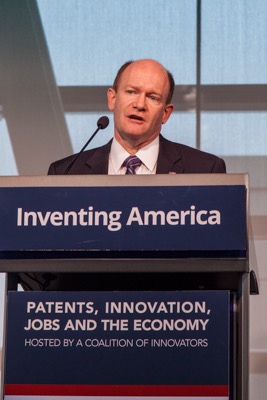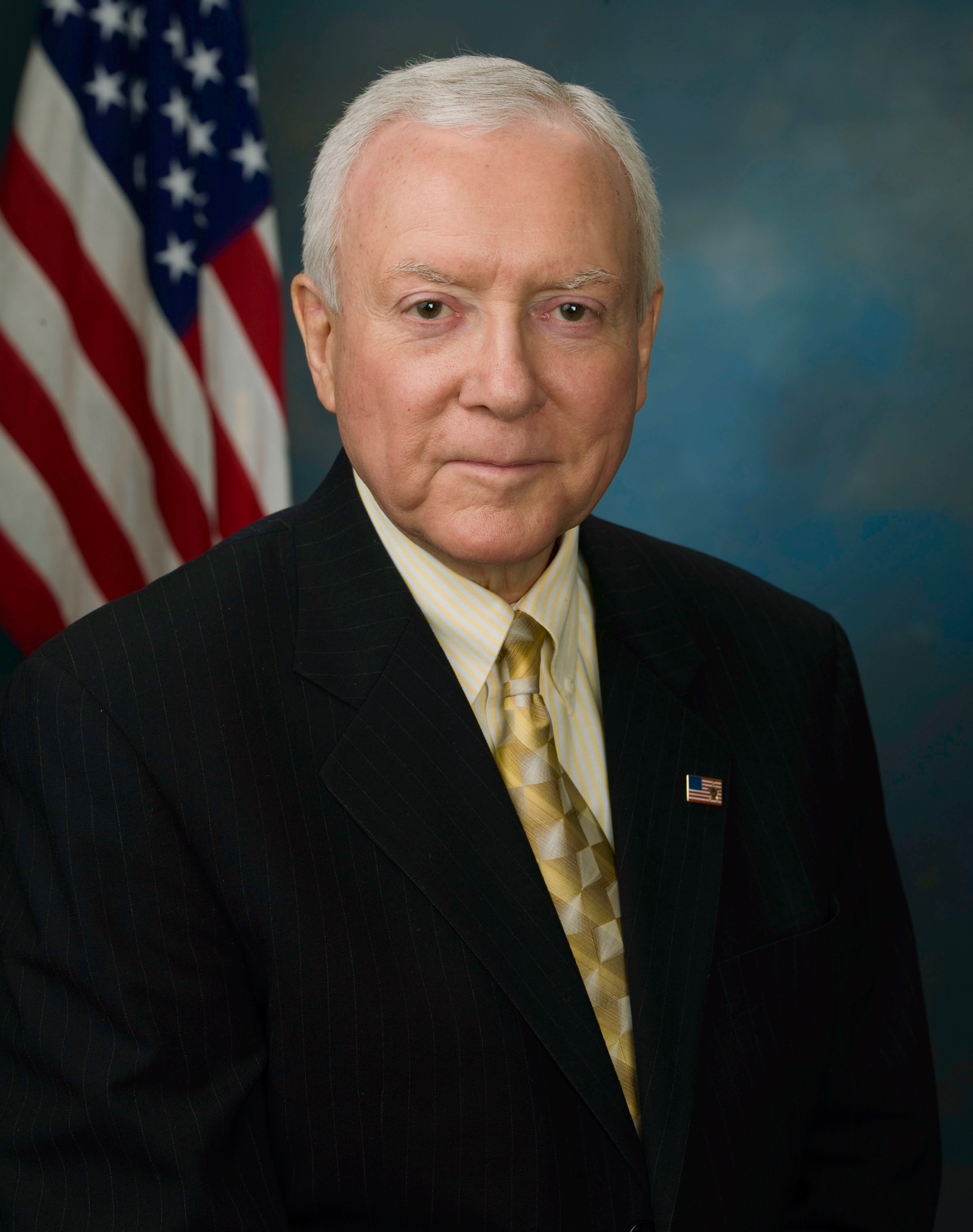Hatch files Amendment to Fix IPRs for Pharma
Senator Orrin Hatch (R-UT), co-author of the Hatch-Waxman Act, filed an amendment in the Senate Judiciary Committee to address what many characterize as abusive inter partes review (IPR) filings relating to brand name pharmaceuticals. According to Senator Hatch, his amendment is intended to fix IPRs and restore the careful balance the Hatch-Waxman Act struck to incentivize generic drug development. The Hatch-Waxman Act encourages generic drug manufacturers to challenge patents of brand name drugs by filing Abbreviated New Drug Applications with the Food and Drug Administration, which can and typically does result in patent infringement litigation in federal district court.
“As the coauthor and namesake of Hatch-Waxman, I have a keen interest in ensuring we have a well-functioning generic drug industry,” said Senator Hatch in a press release published last night. “My amendment will ensure that Hatch-Waxman continues to operate as originally intended by protecting the ability of generic drug companies to develop low-cost drugs while at the same time ensuring brand-name companies have sufficient protections in place to recoup their investments.”
In recent years inter partes review (IPR) at the Patent Trial and Appeal Board (PTAB) of the United States Patent and Trademark Office (USPTO) has created an alternative path to challenge the patents of brand name drugs; a path alternative to the path envisioned in Hatch-Waxman. Those who support the Hatch-Waxman regime view IPRs as upending the careful Hatch-Waxman balance.
Senator Hatch’s amendment, the Hatch-Waxman Integrity Act of 2018, would require a generic manufacturer wishing to challenge a brand-name drug patent to choose between Hatch-Waxman litigation, which affords certain advantages such as being able to rely on the drug innovator’s safety and efficacy studies for FDA approval, and IPR, which is cheaper and faster than Hatch-Waxman litigation but does not provide the advantages of a streamlined generic approval process. Parties would not be able to use both. In this way, the amendment aims to fix the misuse of IPRs by generics as parallel and duplicate proceedings to disputes already in place under Hatch-Waxman.
Politically, this Hatch “pick a path“ amendment is going to be paired with S. 974, The CREATES Act of 2017 (H.R. 2212). This legislation aims to enable the sharing of samples so that generics can compete more effectively. You can learn more about the substance of the CREATES Act by reading Senator Leahy’s summary here. The Creating and Restoring Equal Access to Equivalent Samples (CREATES) Act enjoys broad, bipartisan support from Senators Leahy, Grassley, Feinstein, Graham, Durbin, Lee, Whitehouse, Cruz, Klobuchar, Kennedy, and Blumenthal. Generics want the CREATES Act, and there are 28 co-sponsors. The bill was voted out of the Judiciary Committee favorably, but Hatch voted against it.
Raising and connecting the Hatch-Waxman IPR fix to the CREATES Act balances two major interests of both the brand and generic industries. Brand needs this Hatch-Waxman IPR fix and generics want CREATES. Like Hatch’s original objective with Hatch-Waxman, each side gains something…resolving a major problem for them…and neither loses anything that they had any reasonable expectation that they would, or should, be able to maintain.
Congress passes Defend Trade Secrets Act by overwhelming margin
 On April 27, 2016, the United States House of Representatives passed S. 1890, the Defend Trade Secrets Act of 2016 (DTSA), by a vote of 410-2. Only Congressman Thomas Massie (R-KY) and Congressman Justin Amash (R-MI) voted against the bill.
On April 27, 2016, the United States House of Representatives passed S. 1890, the Defend Trade Secrets Act of 2016 (DTSA), by a vote of 410-2. Only Congressman Thomas Massie (R-KY) and Congressman Justin Amash (R-MI) voted against the bill.
The DTSA was authored by U.S. Senators Chris Coons (D-DE) (pictured left) and Orrin Hatch (R-UT) and cosponsored by nearly two-thirds of the Senate. The bill was previously passed by the Senate on April 4, 2016, by a vote of 87-0, and will now move on the White House. Even before the Senate passed the DTSA, the Obama Administration voiced strong support for the bill. President Obama is expected to quickly sign the bill into law, which will make it the the first-ever comprehensive federal trade secret law.
Once signed by President Obama, the DTSA will amend the Economic Espionage Act of 1996 to create a federal civil remedy for stealing trade secrets and give innovators another procedural avenue by which to protect their intellectual property from theft.
05.4.16 | Congress, Trade Secrets | Gene Quinn
Key Republicans on Patent Reform in 114th Congress
Over the last several days on IPWatchdog.com, we have published articles introducing the Republicans serving on the House IP Subcommittee and the Republicans serving on the Senate Judiciary Committee. In the coming days, we will publish similar profiles of the Democrats.
Today, we focus on four key players on the Republican side of the aisle that will influence any patent reform efforts – Congressman Bob Goodlatte (R-VA), Congressman Darrell Issa (R-CA), Senator Chuck Grassley (R-IA) and Senator Orrin Hatch (R-UT). Each of the aforementioned Members of Congress are on record supporting patent reform of some kind during the 114th Congress.
 Bob Goodlatte (R-VA), Chairman of the House Judiciary Committee.
Bob Goodlatte (R-VA), Chairman of the House Judiciary Committee.
The primary subcommittee dealing with intellectual property matters in the House of Representatives is the Subcommittee on Courts, Intellectual Property, and the Internet, which is a subcommittee of the House Judiciary Committee. This means that Congressman Bob Goodlatte will have an extremely important role with respect to shepherding any intellectual property legislation through Congress over the next two years. Goodlatte has signaled that he will focus his own energies on copyright reform, deciding to keep any copyright reforms the purview of the entire Judiciary Committee. Still, Goodlatte has shown keen interest in the patent system over the years, including the most recently failed patent reform legislation during the 113th Congress. You can rest assured he will be heavily engaged in the 114th Congress.
01.14.15 | Patent Issues, Patent Reform | Gene Quinn
Hatch Writes President Over Lack of PTO Director

On Monday, June 2, 2014, Senator Orrin Hatch (R-UT) wrote to President Obama expressing concern with the fact that the United States Patent and Trademark Office has been without a director for more than 16 months. The letter from Senator Hatch to President Obama is reproduced below.
In the letter, Senator Hatch also questions whether USPTO Director Michelle Lee was appointed consistent with 35 U.S.C. § 3(b)(1).
There has not been a Director of the Office since David Kappos left in January 2013. Still, the Director did not nominate Michelle Lee for the post as Deputy Director. There has been much made about this in some circles, some saying that the appointment of Lee was in violation of the law. I don’t see a real problem in this case.
06.4.14 | Patent Issues, posts, USPTO | Gene Quinn


No Comments
08.7.18 | Congress, Patent Issues, Pharma | Gene Quinn